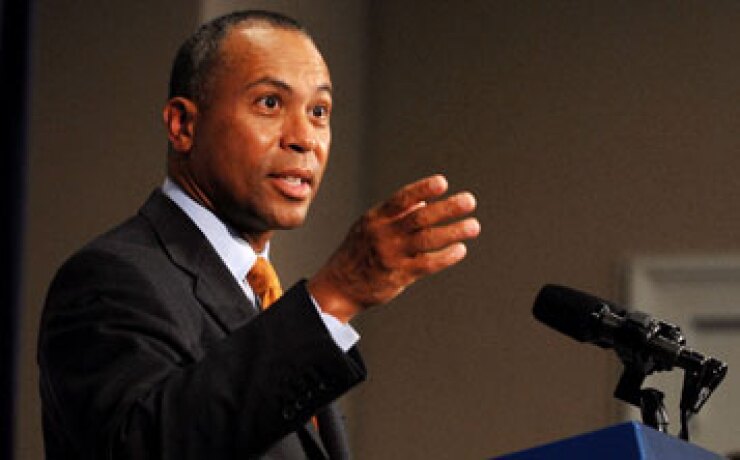
Gov. Deval Patrick submitted his
"This is a sensible, responsible budget that supports our growth strategy of investing in education, innovation, and infrastructure," Patrick said at a press conference in Boston.
The budget would expand the sales tax to carbonated beverages and candy, which Patrick said would add $57 million in revenue. Lawmakers previously have defeated the so-called Twinkie tax.
Patrick also wants to increase transportation spending by $141 million and stop paying for transportation payroll costs, including Massachusetts Bay Transportation Authority employees, through bonding. "This will allow millions in additional capital investment, consistent with the 2013 transportation finance law," he said in his budget message.
The MBTA, which runs Greater Boston's transit system, has been a division of the state Department of Transportation since a 2009 reorganization.
The $141 million, he said, supplements the $12.4 billion included in the MassDOT five-year capital investment plan.
In addition, the proposed budget would have $100 million in new aid for local school districts, and more than $68 million in additional funding for public colleges and universities.
The legislature last year passed a $500 million transportation package, scaled down from Patrick's proposed $1.8 billion.
Patrick, a Democrat who is not seeking re-election after two terms, last week announced a $50 million investment to cope with the effects of climate change, notably on public health, transportation and energy. His budget also includes $12 million for nearly 6,000 summer job training opportunities for youths.
Patrick postponed Tuesday night's scheduled state of the commonwealth address because of the snowstorm.
The state constitution requires the governor to submit a budget within three weeks of the legislature reconvening. The House and Senate will pass their own versions, then submit a compromise budget to Patrick by June 30.
Last year's budget included a 6.25% tax on software services that the state later repealed after pushback from the technology industry.
Officials from Patrick's office and the legislature have agreed on a revenue estimate of $24.3 billion for the fiscal year beginning July 1. As of Dec. 31, state revenues are $281 million above estimates for the previous fiscal year.
Fitch Ratings and Standard & Poor's rate the state's general obligation bonds AA-plus, while Moody's Investors Service rates them Aa1.
Moody's in December said its rating "reflects the commonwealth's strong financial management practices and its demonstrated willingness to balance its budget when necessary through spending cuts, revenue increases and use of reserves."





